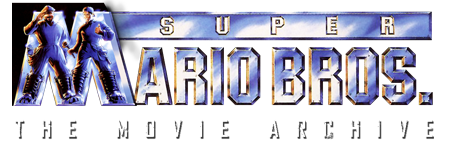Exclusive Interviews
Richard Edson - SMB Archive Interview: 04/03/2011 by Ryan Hoss and Steven Applebaum

Without a doubt, the characters of Iggy and Spike are one of the most universally praised aspects of Super Mario Bros. l was absolutely delighted to have the opportunity to interview one half of that duo along with Steven. As our first (posted) dual-interview from the interviewer's side, you really get your bang for your buck with this one. Not only do we discuss with Richard his experience on the film and what his thoughts are on it now, we also get some really great additional stories--ghosts, dancers, and Dennis Hopper all make appearances here. Enjoy. --Ryan Hoss
Following Mojo Nixon, Richard Edson was the second member of the lead cast that we were able to get in touch with. As you will all soon find out, he and Fisher Stevens developed most of the key dialogue, scenes and concepts for their characters seen in the second half of the film.
Because of this, they helped turn what would have otherwise been boring, inconsequential characters into real show-stealers with some of the best dialogue-exchanges in the film. --Steven Applebaum
Richard Edson: Alright. Fire away.
Ryan Hoss: Okay. Well, first off, can you talk a little bit about how you got the role? Did you have to audition or anything like that? How you got involved in the project and all that?
RE: Now that's a good question. How did I… How did I… Wow. I imagine… That's really strange because I usually remember things like that very clearly, but I do not remember… Oh, no no! I did audition. I did. It was funny because they auditioned two people at the same time, both Iggy and Spike together. So they would have two of us come in at the same time, which is kind of weird because you're basically competing against each other. So you're not really in an acting situation in which you like to work with somebody, but basically you want to out-shine the other person. You don't really care what the other person is doing.
So I remember it was in a west Hollywood rehearsal studio and the guy I was with, I remember he was really nervous, so I had to kind of calm him down at the same time I had to completely ignore him. I remember it was hard because I had to do my thing and respond to him, but he was not giving me what I needed so I just did my thing. I remember walking out together and he felt like he blew it, which kinda he did. I don't remember his name, but that's how I got the part and I think I just did it once, but I have a vague recollection of going back, but I'm not sure. Anyway, that's how I got it and it was probably somewhere in the spring of that year. What was it, '94? '93?
RH: Probably '92.
RE: '92? When did we shoot it? In '93? '92?
RH: It came out in summer of '93, so it was shot in '92.
RE: So it was the spring of '92. What was nice was we did the whole thing in Wilmington, North Carolina, which was then a "right to work" state, which meant they didn't recognize unions so that a lot of companies were going to North Carolina to work because it was cheaper and because it was-- Well, it wasn't Disney at the time. It was an independent film. Jake Shields? No, Jake…
RH & SA: Jake Eberts.
RE: Jake Shields. You know who Jake Shields is?
RH: No idea. (laughs)
RE: (laughs) He's an MMA fighter. Anyway, so they flew us down… Oh no, no! What happened… That's right. I was in New York at the time and since I was going to be there for 10 weeks I drove my car down from New York to North Carolina, which was a lot of fun, for two days. Took a lot of back roads and went through this place called… What was it called? "The Swamp." It was on the Virginia/North Carolina border. It had a great name. Something like "Hell Swamp," or whatever, but I had a 1971 24z. I should have charged them what the cost of what renting me a rental would have been. Maybe I did. Those are the little things you do to make more money.
Anyways, they were spending a lot of money so they really treated us well. I had a house to myself that was like three-bedrooms. It was on the water and I had a boat that went with me as well as a basketball court, so it became like the house where people would hang out. Okay. Need another question.
RH: Okay, well I guess my next question would be to ask whether your audition was just for Spike or for Iggy as well? Or were the parts interchangeable?
RE: I think it was Spike. I'm pretty sure it was for Spike and I didn't know who was gonna play Iggy until I showed up, which was Fisher Stevens, who I had known in New York. But Fisher: he's kind of a competitive actor and I could tell right away that it could possibly be a problem because it was very strange. We had the read-through on the first [or] second day there where all the actors got together with the directors and, you know, it was Annabel and Rocky and nobody knew, really, how it was gonna work-out with a "two-headed director." This was our first time together and because Bob Hoskins--he was the lead of the movie, the most famous--and you had him and Fiona Shaw and John Leguizamo and Fisher. So you had a lot of people with heavy theatre-background.
Dennis Hopper was not there that day, but you had a lot of people with heavy theatre-background and we're doing this kind of "cartoon" movie whose script was constantly being revised, so the script that we had originally read was different from the script we read when we got there, which was being constantly rewritten. I was a little disappointed with the new script because it seemed to have dumbed everything down and made everything really silly and before there was a little more meat to it but, in either case, we all got together in the reading room and it was kinda nerve-wracking because it's the first time everyone's together and the first time you're actually reading the script together and you're doing you're parts and it's like how much do you actually want to be in-character or is it more of an exploratory thing. But what's interesting was one of the first lines was Bob Hoskins, Mario, and he did it in a completely monotone [voice], absolutely no inflection at all, which was just reading it.
So that was pretty interesting because it kind of let everybody else off the hook. If he was just reading it straight-out and flat everybody [else could also be] kinda really non-committal, which is good. I like that because we can familiarize ourselves with the script and each other and there wasn't a lot of pressure, but it certainly didn't have any life to it, so when it was over I was expecting the directors to say "Okay, that's a good first reading. Let's talk about it and think of ideas in terms of our characters," and this and that.
But what happened was the directors go "Ohh, that was wonderful. That was just great," and just praised us. That was when I first got an inkling we might have a problem because it was an opportunity to start doing something, but they were happy and wanted to move onto something else. That was the only time we really got together like that and had an opportunity to work on characters and work on the script. When the directors kind of refused that opportunity I was like "Uh oh." So that kind of set the tone for the rest of the movie. (laughs)
SA: Yeah, it seems Rocky and Annabel didn't really care for the characters or the story. They were all about the visuals.
RE: Yeah. Which, weren't so great!
SA: I actually think the visuals are great, but the movie does suffer without the necessary plot.
RE: Did you say they are great?
SA: Yes.
RE: Oh, you like the visuals? I was disappointed because most of the visuals were production-design type visuals and not digital effects. It had a couple visual-effects, but it was mostly the design and they had taken over this old cement factory, which became the set, but in terms of the effects: I thought it was a wasted opportunity because the whole thing about Super Mario Bros. was each level was like a portal into another realm, which would fit perfectly with a more digital type of approach to the design. But it was really you had Brooklyn and it had… What was it called? "Dino-Land," or whatever?
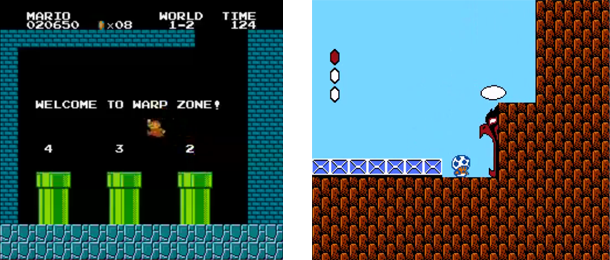
"I thought it was a wasted opportunity because...each [Super Mario Bros.] level was like a portal into another realm."
RH & SA: Dinohattan.
RE: Yeah, yeah, yeah. So in terms of the visuals it was just heavily production-design and not conceived in a way that I thought might have served it better. Yeah. They definitely didn't seem to be interested in the story or the dialogue or anything like that. Or characters. (laugh)
SA: And that's a real shame because the characters were really good, especially the way they were originally written and even in the movie you can still see how good they are, but none of them are resolved in any way that makes you appreciate them.
RE: Especially Iggy and Spike.
RH: Oh, definitely.
RE: They were like an afterthought. It seemed like. But I think part of that was that the script kept changing and I think I mentioned to you, Steve, is what was really interesting is that the night we were supposed to do our first scene, which was the night scene of us watching Daisy on the street and we had some back-and-forth dialogue and the dialogue that was written for us was really lame, so Fisher and I devised this plan that we'll give them an alternative. We'll write our own alternative and if we have time we'll do theirs and then we'll do ours.
So we did theirs and it was predictably lame, but we did it the best we could and then we said "Hey, Annabel, Rocky… We took the liberty to improve the dialogue. You want to hear it?" [And they said] "Yeah, yeah, yeah. Let's just shoot it," and we got all set up. So we went into our dialogue and it got laughs and they loved it and that was eventually used, but from that moment on we got permission and the license to rewrite all our dialogue, come up with new scenes, [and] whatever we wanted to do. They were more than happy to do it and so Fisher and I would get together and we would work on scenes and we would come up with our dialogue and it got to the point where we wouldn't even do their dialogue anymore.
And it was crazy because I don't even remember them asking us what it was. We would just come in, rehearse it, and then we would shoot it. You know, the whole thing with-- I forget about us becoming smarter and going through the machine… I think that was my idea and, you know, I kind of used the idea from The Wizard Oz when the wizard would give the Lion his courage and the Tin Man his heart and so I would have all these calculations. I would come out of the machine and I would have all these mathematical calculations. I came up with that and I would multiply a strange number like 1,099 by itself and come up with a number so if anybody ever would check it actually would be the square root of whatever number I said it was and they were like "Oh yeah, that's great! Yeah, yeah, yeah…"
But what would happen with Fisher is, he and I, would split the lines exactly 50/50. So if he had a line, I had a line. If I had two lines, he'd have two lines. It was nothing we ever talked about, but I knew that Fisher being the kind of guy he is he likes being the center-of-attention, so I had to be very careful and make sure that we were 50/50 the whole way and by the end: he had a line, I had a line. Line, line, line, line; back-and-forth, back-and-forth, back-and-forth and that's kind of one of the ways we devised our characters and also the way we devised the way to work together.
SA: Well, the funny thing about the answer you give for that mathematical calculation is that its actually wrong.
RE: It is wrong?
RH: Yeah. Well, in the movie you say "What is the square root of 26,481," and the answer you give is 191 when that's actually the square root of 36,481.
RE: Oh, well you know I think I might have tried to memorize it and when it came time to do it I couldn't remember it and I'm like "Only extreme film nerds like yourselves are ever gonna--
RH & SA: (laughs)
RE: (laughs) --try to figure that out," so I was like "I'm not gonna ruin the performance by having to memorize--" I don't remember that because memorization--stuff like that--is not my forte anyways, so I tried to remember the right number, but I think when it came down to it I was more into the performance and I was like "I'm just gonna say whatever number pops into my head. If it's right it's right, if it's not they'll get it right," so thanks for reminding me.
RH: (laughs) Well, you know, the funny thing about that is I just realized something in hearing you talk about being influenced by the The Wizard of Oz. In that film, when the Scarecrow gets his diploma and he says that whole spiel of stuff that's supposed to make him sound smart--
RE: Uh huh…
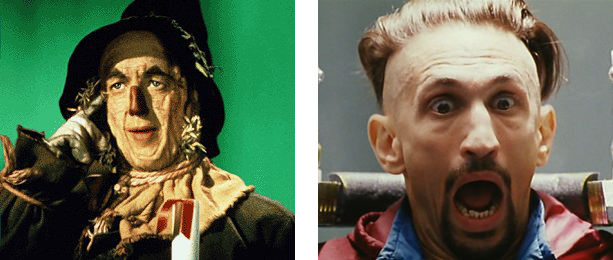
"Oh, nice. So I have a good tradition."
RH: --the stuff that he says in that movie is also actually wrong.
RE: Oh, nice. So I have a good tradition.
RH: So it actually works pretty well.
RE: Oh, nice. Nice. Feel free to talk about that. I don't really care. It's not something I'm particularly proud or ashamed of. It was just funny because given all that freedom to do what we wanted to do also gave us responsibility to kind of make it great, but it was weird because once we became smart it never really had much to do with the story from that point on. I think it was more to demonstrate the capabilities of the machine and that some people would get smart and some people would devolve. Some people would evolve and other people would devolve. Is that correct, if I remember?
RH & SA: Yeah.
RE: So it was more of a demonstration thing of the machine. But it's funny because we would talk to them all the time about it. "Okay. So now what happens?" because we kinda disappeared for the last third of the movie or something, but they didn't seem to be that concerned. (laughs)
SA: That's actually an interesting change because in the original shooting script we have Iggy and Spike are actually de-evolved and made dumber. So, they originally returned for the final third of the movie, but they didn't do anything past that point except eat garbage.
RE: Yeah, and I think either I or Fisher came up with the idea that it would be more interesting [and] more fun that we suddenly became smart and we could then… I think the idea was basically we realized we were working for this idiot, King Koopa, and our sympathies then became with the Super Mario Bros. An idea they liked, but never got played out.
SA: As far as the evolution/de-evolution of your characters, some people think they're actually still dumb considering Spike gets that calculation wrong and they later drive the buggy over the cliff in the desert. They're not actually smarter, they just have a higher vocabulary.
RE: Well… (laughs) I mean, it was… I think it was an attempt on our part to add another element to the storyline that never really got taken advantage of, so I guess it could be looked at either way. So, yeah, I guess we did get the calculations wrong--(laughs)--and drive over the cliff.
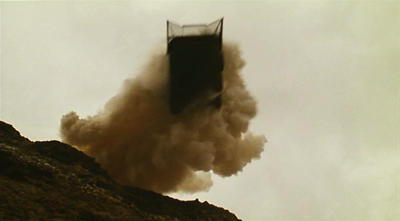
"I guess we did get the calculations wrong--(laughs)--and drive over the cliff."
RE: And I think by that time when we were driving over the cliff they had fired the DP and the directors. That's right, the original DP was fired after the first week and the Academy Award-winning DP Dean Semler was hired and then when it was running over they fired Rocky and Annabel. Or, I don't know if they fired them. They just told them to leave and Dean took over. And as ineffective as Rocky and Annabel were, Dean was even worse because I remember his direction was basically--he's a huge guy--and his direction was kind of pushing you into the place that you were supposed to be. He'd say "Oh no, no! Don't stand there! Stand here!" And he's a huge guy and I remember he's almost picking me up and putting me down and I'm like "Oh, okay. That's his directing-style." He's [not] really concerned about character and story. He was just concerned [about] composition, basically.
So I think by that point it was like three extra weeks. We were all getting paid and we had all pretty much given up on it and we were just like punching the clock, basically, because it didn't make any sense. Nothing really made any sense in the whole production at that point except that we were having a great summer and that's probably what I remember most [is] 10 weeks to 12 weeks living high as a hog in North Carolina. You know, making more money than I had ever made before, purchasing my own house [and] boat.
I remember my sister and her family came down and I of course had more than enough room to put them up. So I would take them to the set and I do remember one day because the Goombas, they had to wear these huge aluminum shoulder pads that extended the size of their body and atop of the shoulder pads was the little head and they could drape the costume over that little structural thing inside and these guys would be walking around all day in the summertime carrying tons of costumes and aluminum infrastructure, whatever, and so they had a full-time masseuse for them which they didn't really take advantage of, but I would take advantage of all the time.
She was a really sweet local girl and she was there and she was getting paid and she was more than happy to give people a massage and so I remember I was taking my little nephew around, Eric, [saying] "This is where the Goombas are," and I showed him all the Goombas and the costumes and the little heads and she was available and I'm like "Hey Eric. Just wait a second. Just let me get a quick massage," and of course I forgot all about him and I came out and he was crying and I had abandoned him. I still feel bad about that. All these years I made my little nephew cry. He was a tough kid, too, so he didn't really cry that often. I just let him sit there, basically, in a room full of empty Goomba costumes while I had a wonderful massage.
RH & SA: (laughs)
RE: I guess it might have been kinda nightmarish for him. I wonder if he's ever gotten over it.
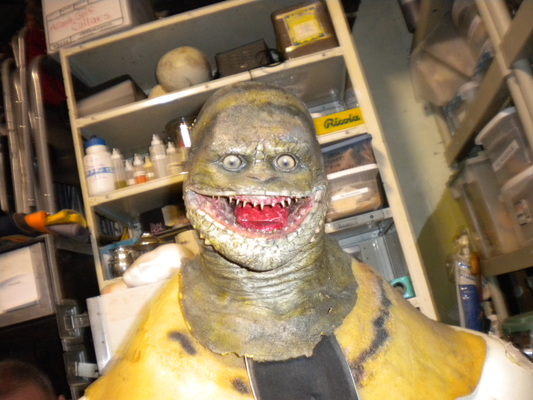
Wouldn't you cry, too?
SA: Well, it's unfortunate that by the time they got to that desert sequence the shooting was less committed because that whole desert sequence was supposed to be the breather for the movie. They just rushed through it to get back into the action and the third-act really suffers because of it.
RE: Uh, if you say so. (laughs) I know you were going to ask us about the rap. How'd you hear about that?
RH: There's a card in the trading card set that has a picture of you guys rapping and a little short description of it. That's where we first heard about it, but there's also the Super Mario Bros. The Movie magazine, which has a page with Iggy and Spike with the full lyrics.
RE: Oh really?
RH: Yeah, that's what it looks like.
RE: Oh, cool, because we had so much freedom and I guess "we"--Fisher and I as well as everybody else on the cast--believed the movie needed as much improvement as possible. We came up with that idea which was kind of the introduction to the night club scene. It had something to do with the little crystal and Koopa was looking for the crystal at that point and it was on Daisy's… Or somebody else had it. Whatever. It had all the dancing girls of Wilmington, basically. Every girl who could dance was hired for this elaborate, choreographed scene which was the introduction to the night club.
So Fisher and I, of course, being selfless and thinking only of the movie figured that, "Well, dancing girls are nice, but… Wouldn't it be great if it was integrated with something that had more to do with the characters," so we came up with that idea. I say "we" meaning "I," but still being in the mode that we had to share everything. It was always "we," but it was definitely I [who] came up with it because of my musical background.
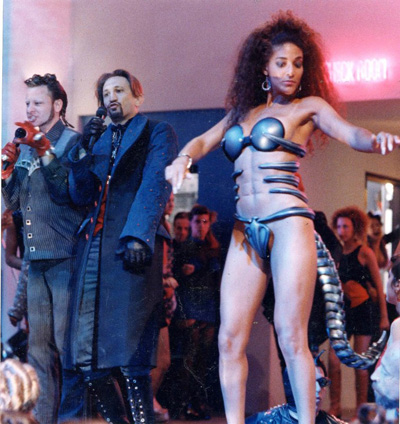
Photo courtesy of MEL
Did this front-and-center dancer have anything to do with why the "rap" scene was cut?
RE: "King Kooper the pooper scooper," was the refrain and we worked it out and I think… What did I have? I actually got a little rhythm machine or recorded a rhythm or got a rhythm somewhere and put it on a little tape recorder and we would rehearse to that and then we took it over there one day to the set and was like "Hey, Rocky, Annabel. We got this little rap we were thinking of doing. We would love to play it for you," and it was funny because it was between a shot of something and there were like 25 people around and we thought we'd give them the idea and a little later we'd go someplace a little more private and they say "Oh, well, let's hear it," and we're like "Now?" and they're like "Yeah, why not."
Because we had the little boom box with us we plugged it in and we did it and they all loved it. Everybody loved it. So it was decided then and there it would be a part of the night club scene. I think we shot it. They did the choreography around it and then it was to our disappointment that they had cut it out because it seemed to go over well and it was funny. I think, Steve, you told me the reason that they took it out was because they thought it was a little too mature or something?
SA: Yeah, that's one of our theories because we have some pictures of that scene and there's a couple of risqué, scantily-clad dancers dancing around you which they may not have wanted so front-and-center in a movie aimed at children.
RE: I think that could be good. I have no idea. They never told me or asked me about it, so I was disappointed because it was a lot of fun to do and we did it really well because, like everything else we did, we would trade off lines back-and-forth and then do unison lines like the chorus, like a real rap. Trading off back-and-forth. I was into rap music then and Fisher's a quick study, so he learned everything really quick and I showed him how to do it and we did it. That's the only thing I remember, "King Kooper the pooper scooper."
RH: We can send you the page. We have it online.
RE: Oh, cool. Would you? And, you know, I do have a bunch of photos that I would be more than happy to give to you guys.
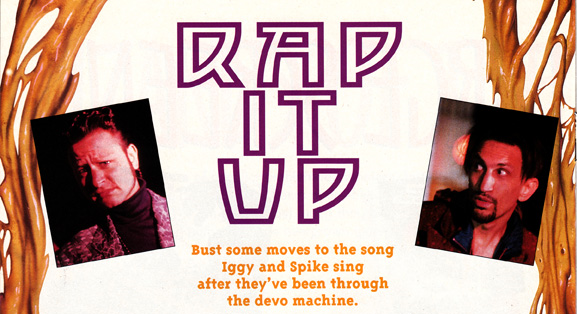
Rap it up! Click HERE for the page with the full lyrics.
RH: That'd be great.
RE: Behind-the-scenes stuff and some stills and all.
SA: That'd be really great. We're always looking for behind-the-scenes stuff like that.
RE: Yeah. I have a bunch of them. And I do remember-- Oh, this is another funny story… Did I have a mustache?
RH: Like a goatee.
RE: I had a goatee. Right. We worked two days and then we had like a week off and then I come back and I go into the makeup trailer and I sit down to get a trim because I had let things grow and the makeup guy or the hair guy does his thing. [And I say] "Oh, no no. But the goatee is not the same. I think you got to do something. You got to trim it or something," and he's like "No I don't. It's the same." I'm like "No it's not. It's my character. I know," and then he's like "Are you telling me how to do my job?" I'm like "No, but I know what it was," and then he started to yell at me and told me to "Get the fuck out of his makeup trailer." I'm like "Are you fucking kidding me?" and he's like screaming, so I'm really pissed off. I leave because he seemed out-of-control. So I left and I think I went to the producer who was not Jake--
RH: Roland?
RE: I think it was Roland, yeah. I told him "Look. This is unacceptable. He's wrong and you got to do something because I can't fucking look at this guy and if I'm going to work with him something…" So he went in there and I think what turned the tables is that they looked at the photos and I was clearly right. And he says "Oh, well you're right. He's sorry." [I said] "No. I want him to apologize to me in front of everybody," and the guy did and then I was like "Now do your fucking job like you're supposed to." I don't know what the fuck his problem was because he wasn't a bad guy and it was something we laughed about later, but it was kind of part of the whole experience where things just weren't the way they should be.
SA: Crazy.
RE: Yeah. (laughs)
RH: About the rap again, do you remember how exactly the scene transitioned? Since it's not in the movie I'm trying to figure out how it would have worked in the movie.
RE: Isn't the scene introduced now by music and dancing?
RH: Yes. Iggy, Spike and the Mario Bros. walk into the club and you had given them disco suits, almost, and then Iggy and Spike go to the bar and have a drink while the Mario Bros. are on the dance floor.
RE: Ahh. Okay. I think the way they might have shot it… Huh. I don't know, to tell you the truth. My recollection is that they… Huh. I don't know. I don't know. I thought it was going to begin [the scene], but if that's already there? But that doesn't make sense. Huh. Or maybe we arrive and then it's them on the dance floor as we're rapping. I'm not sure.
Of course, they had the two writers there. The script was changing all the time. You had Roland, you had Jake. Everyone is putting their two cents in. The fact that we were doing it everybody liked it, but I think maybe it was one of those things "Well, we'll figure it out later. We'll fix it in editing," or maybe that might have been the reason: there was no transition so they couldn't make it work that way, but that's total speculation on my part.
RH: Right. Well, a little while ago we actually talked to the editor. Steven, didn't he say that scene was already in the film at one point as a work print?
SA: I believe so. The only thing I can remember for sure is that he said it wasn't cut to get the rating down. He said nothing was cut because of the rating, but that's just his memory. We can't really be sure of anything at this point.
Parts of the "Spike & Iggy Rap" can be seen in this BTS clip from Entertainment Tonight, starting at :26
RE: I think a lot of people [felt] that once it was over, it was over because with Rocky and Annabel it got to the point where--and we realized this pretty quickly--is that they would give us completely contrary directions. Something like "You enter really slow and serious" or "You enter really fast and frantic." Just something completely contradictory. So it wasn't clear who was-- They were pretty equal in terms of authority, so it wasn't like "Well, who should we listen to?"
So basically we ignored them both and do it our own way, which was good because I think we had each other. And I think also it was like that with John and Bob. They would just do what they wanted to do because they could work with each other. Bob was happy because, I mean, whatever direction we did get was just pretty basic and barebones anyway, but if you're getting contrary barebones direction it's a little confusing, to say the least. So, we just ended up ignoring them. (laughs)
RH: (laughs) So, in terms of deleted scenes it seems there's quite a bit that's not in the movie like the rap. Offhand, do you remember anything you did with Iggy and Spike that’s not in the film?
RE: No. That's really the only thing I think that we did because most of what we did do seemed pretty important to the storyline.
RH: Right. And it was.
RE: That was basically our function [was] to move the story along, whenever we showed up and that's why I think we were dropped the last third or whatever because we weren't needed for the story [anymore]. I do think I was pushing for us once we regained our mental maturity, so to speak, we realized what an asshole King Koopa was and that our sympathies were now with the Mario Bros. and that we would be part of their team. We would be helping them and in that way we could be integrated into the story. I think they liked the idea, but they never got around to figuring out how that would work.
RH: Well, one interesting thing is that we spoke to one of the writers, Parker Bennett, and he gave us an entire ADR revisions document that basically shows us a lot of snippets of scenes that were at least filmed and got to the stage of being ADR looped. So there's a couple interesting things with your characters that aren't in the movie.
RE: Oh really?
RH: Yeah. One of them is--please correct me if I'm wrong, Steven--but one is where at the beginning of the film Spike buys hotdogs. It seems like there was some little scene where you actually see Spike buying the hotdogs and talking to the hotdog vendor.
RE: That's me?
RH: Yes.
RE: I do… Yeah, I do kind of recall that, but… But there's a scene with the hotdogs in the movie, right?
RH: Right. He's walking down the street like he had just bought them, so there could be something right before it.
RE: Where I was seeing the vendor?
RH: Right, right.
RE: Huh. I don't know. I do remember doing that little visual gag of me walking into the glass. These two workers carrying a glass. I was really proud of that because my reaction is like three feet from the glass itself, but the way they shot it you couldn't tell. So the timing had to be just perfect and my reaction had to be just perfect. It was total physical kind of acting comedy, which I like, so I was really proud of that little moment [in] how well that looked, that I had actually walked into a sheet of plate-glass. That's the magic of filmmaking. I didn't really walk into it. (laughs)
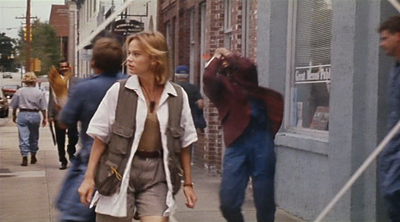
"That's the magic of filmmaking."
RH: It does work because you walk into it and you hear the sound effect and that sells it.
RE: Yeah, and my timing, too. My incredible facility with physical comedy.
RH: Well, another scene is, like you were saying, is how your characters are dropped. In this revisions document it says that there's a scene where--this is after Koopa has been de-evolved into slime--Spike and Iggy say "It's time to get another job" and then both of you say together "Hm…" while surveying Koopa's suite. So you're looking at Koopa's tower thinking of taking over his job or something like that.
RE: Riiight. I kinda vaguely remember that. Yeah, yeah, yeah, yeah, yeah. I vaguely remember that, but we kinda disappeared for awhile and then we show up. I think it was kind of an attempt to force us back into the storyline, but I guess it didn't work.
RH: Well, in the film--and Steven and I have talked about this a lot--but in the film itself the last time you see Iggy and Spike is when they show Daisy where her father, the big ball of fungus, is. They then say "Live to fight another day." It's really cryptic. It's almost like Iggy and Spike had some sort of plan. They just say they'll “Live to fight another day" and then quietly exit the room. When you watch the movie it seems like they're cryptically going somewhere and you never see them, so you wonder what--
RE: I think that was just because of the changing nature of the script and that our characters had changed or at least the perception was that we had changed and they wanted to somehow integrate them into the movie, but I think they just never got around to it and then we were running over. I guess the big thing was that Rocky and Annabel… I think they just told us "Oh yeah, by the way, Rocky and Annabel are no longer with us. And Dean is going to direct the rest of the movie," and I'm like "Okay… As long as the paychecks are still able to cash them."
I think at that point we'd written it off as a coherent movie and it was just like "Let's just finish it." But we were in such a comfortable place and we were getting paid so well that it was just one of those things where we could write it out and not really worry about it and when it did come out and it didn't do well and it got lambasted by the critics and then I saw it I wasn't surprised in the least.
RH: Interestingly, Iggy and Spike just kind of depart the movie, but then there's the bonus scene at the end of the film after the credits. I guess you're in the Mario Bros.' apartment and there's the two Japanese businessmen.
RE: Oh yeah! Yeah, yeah, yeah, yeah. Whether that was my idea--I kind [of] think it was, but maybe I'm just taking too much credit for it--was that we would switch sides, basically, and become friends and helpers of the Mario Bros. So, I think they realized that they were doing the movie and us a service by just dropping us "So let's try to wrap it up somehow and get them back in here," and that whole thing was written very late. I think that was just an attempt to shoehorn us back into the movie and kind of resolve our story.
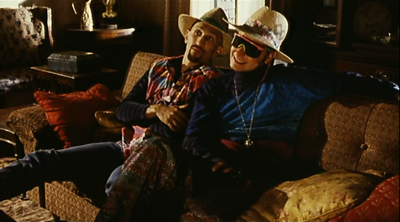
"I think that was just an attempt to...resolve our story."
RH: Cool. Well, a couple hours ago I interviewed Robert Rothbard, the production manager. He couldn't remember if it was Iggy or Spike, but he said that he remembers a scene with "Richard Edson's character" where they had you climbing up a building and there was something with steam involved.
RE: Steam?
RH: Yeah, and that's all he could remember. He said something about them shooting it wrong and that they had to do a couple of takes to get it right, but it's not in the movie. Something with your character climbing up a building.
RE: Okay… Huh. Maybe something with the cages. Something with the cages. I remember they had the stacked cages where they would put prisoners or something.
RH: Yeah, that was the police department.
RE: Maybe something like that or doing some spying or something. Maybe it was in the main drag of the city… I don't remember because usually if they came up with ideas for us it usually made no sense, so I didn't pay much attention to them. But the ideas that we came up with usually made more sense--(laughs)--so those are the ones I remember best, but I vaguely remember something about some climbing thing and maybe it was at the police station.
SA: Well, similar to that, we heard from makeup artist Jeff Goodwin that they tried to shoot a scene in the Brooklyn portion of the movie where either Spike or Iggy eats a fly off the windshield of their car with a projectile tongue, but they couldn't get it to work.
RE: It didn't work? I thought… Didn't they use something like that? They animated it?
RH: It's not in the movie.
RE: It's not in the movie?
RH & SA: No.
RE: I do remember and I think that was Fisher's character because he bought some lizards and he kept them where he was staying and he would study the movements of the lizards and I think he came up with that idea. Then they had the special effects department go to town and work on it… This tongue-extender. I do remember seeing… Nobody did that? There's nothing like that in the movie?
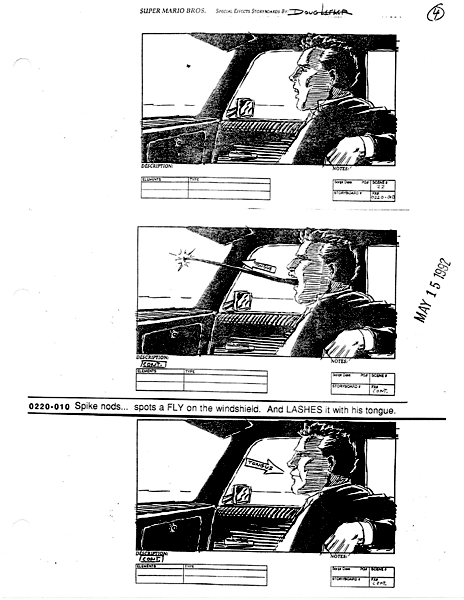
"It looked pretty cool, but maybe there was just no place to put it."
RH: Well, the only thing that comes close is when the small dinosaur Yoshi, who has a small extendable tongue, comes out and trips Lena, Fiona Shaw’s character. That's the only thing similar.
RE: Huh. It was definitely Fisher's idea and his thing. I do remember seeing something, so maybe they did shoot it and then they had the CGI guys do some kind of mock-up of it because I do remember seeing it and thinking it looked pretty cool, but maybe there was just no place to put it.
SA: So he was basing his movements on a lizard?
RE: Yeah. That herky-jerky way he was moving was kind of based on the idea that since we had evolved from reptiles instead of mammals that we would have some residuals. I think maybe I kind of incorporated some of that too in some of my movements.
SA: Did you have any kind of reptile or dinosaur in mind or did the directors say your characters were descended from anything in particular?
RE: No. No, everything was really vague and I thought so many of the ideas were just so silly. Not childish. Not childlike. The whole thing about the whole "hotdog gag…" It seemed so silly. I'm not sure if… I don't know. We had some thing about the hot dog. About dogs. Eating dogs. It was just some bad joke about dogs.
SA & RH: Yeah. (laughs)
RE: That's in the movie?
RH: Yeah. You hand Iggy the hotdog and you say "They say it's dog," and then you both start eating hotdogs without the buns. (laughs)
RE: Right, right, right. We throw the buns out the window and then we see Daisy. "Oh, there's Daisy!"
SA & RH: Yeah.
RE: Some silly shit. (laughs)
SA: It's kind of funny outside of context, but in the actual movie it is a little lame. Anyways, this is a little related to the reptile ancestry question, but I noticed that your hairstyle in the movie is different from your usual hairstyle and what I've seen in other movies that you've been in. Since Dennis Hopper's hair is reminiscent of dinosaur ridges and Mojo Nixon had a spiral haircut, do you know if they were going for anything in particular with your haircut or Fisher's?
RE: Umm. No, but the idea to shave off the sides and the back was my idea. I was just going for "Since we're cartoon characters let's just do something as radical as possible," and I think presented the idea to them and Rocky and Annabel just seemed really amenable to whatever we came up with and I think that most of the stuff we came up with were good ideas and improvements. I was shocked at how little direction and how little involvement they seemed to have in making decisions like that.
So, they definitely did not have any input in that and, as far as our costumes went: they had some very definite ideas and I think they might have taken a few suggestions of ours. I had an athletic kind of sweatshirt underneath my suit jacket. Something. I think that was my idea to wear that. I forget, because the costumes are so wild and over-the-top that it was fun to work with them.
All the professional people on the movie were great. They were all the best and they were all really pro and most the times on movies you find people are really kind of easy to work with, especially if you're an actor. They like working with you and they all incorporate your ideas. They respect the fact that you're not just a visual, you're a character, and you have to walk around in these outfits--these costumes--and if you're not comfortable with them it's going to affect your character. It's very professional like that. I do remember working with them and it was fun and then also doing the elaborate rap.
We had a couple of rehearsals with the choreographers and the dancers and the dancers were really cute, I remember. I had a crush on one of them, and she looked much older than she turned out to be because when they put them in the skimpy outfits she seemed older and I think I talked to the people who were the local talent coordinators. I'm like "Can I ask her out or something?" and they had recommended "Well, come over to our house and we'll have dinner." The two of them were a couple and this girl.
I remember showing up at the dinner and the girl looked 14-years-old and really intimidated and really shy and she could hardly put a sentence together. She was just so nervous and I became "Oh my God. What the f*ck did I get myself into here?" I remember they were real Southern, unsophisticated people and their big meal was some kind of chicken dish, which was basically chicken-over-rice with a can of Campbell's mushroom soup poured over the top. It was really horrible.
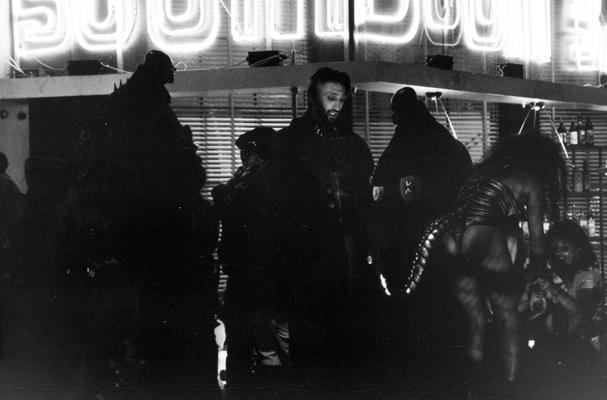
Photo courtesy of MEL
No explanation needed...
SA & RH: (laughs)
RE: The girl had nothing to say. I felt really awkward and they had nothing to say, except they did have the two biggest fish tanks I've ever seen. One in the living room and one in their bedroom. I mean, imagine the biggest TV you have ever seen. It must have been like 72 inches [or] 100 inches. It was huge. They just dominated. The house wasn't that big so it just dominated the whole house and then they had an even bigger one in their bedroom. "Okay."
It's good to get out of New York and L.A. to see how other people live, but whatever. (laughs) So, that didn't work out. But she was cute in her costume, that's for sure. (laughs) And a good dancer, but I guess with the makeup and everything it made her look much older than she actually was.
SA: When we first started the interview you said that your characters were different and they kind of dumbed them down.
RE: Yeah, the script that I had read when we auditioned to the new script. I was really kind of disappointed at it. Just all these silly gags like the "dog." It just wasn't funny. I don't know if that was the writers or they were being pressured to come up with dumb stuff and they had better stuff but I do remember that they were the ones that might have told me that it was so hard for them to write because they were being asked to dumb everything down.
SA: Well, do you remember the animated intro at the beginning of the movie with Dan Castellenata narrating?
RE: Is that in the movie?
SA: It's in the very beginning where they have cartoon dinosaurs talking.
RE: No, I kind of vaguely [remember] maybe.
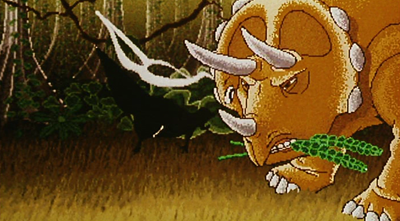
"Some silly shit."
SA: The writers were asked to write things like that because the executives felt that the audience wouldn't get the concept of the movie and needed it spelled-out. So, a lot of the really dumb things in there were kind of mandated.
RE: Uh huh. That's what Parker tells you?
SA: Yeah.
RE: Yeah, well that's the way it was explained to us was that the target audience was kids and the original script was a little racier and a little more grown-up. It was kind of more for teenagers than for kids. It's crazy that they would put themselves in that position without having an agreed-upon script. When we got there we got a new script that was being rewritten as we began shooting.
So, it was like they didn't really know what kind of movie they wanted to make. I think that's part of why it turned out the way it did as well as, I think, not taking advantage of the way in the game and the way in digital worlds where you can instantly change worlds and environments like going through one portal or door and then you're in a new environment. The only portal was the one between Brooklyn and "Dino-world," which is, c’mon… That's such a dumb name. "Dino-World," right? That's what it was? Or "Dinopolos?" "Dinohattan?"
SA: Yeah, Dinohattan. It's like a pun off "Manhattan." Instead of men it's dinosaurs.
RE: Yeah, right. It's so dumb. I mean, it's so obvious that it's not funny. It's not clever at all.
SA: Well, it's the best name they have because the earlier names were a lot stupider.
RH: Oh, they were the worst.
SA: They had "Dino-York" and "Dino-Yuck" because it was "gross." So I guess "Dinohattan" was the very best thing they could come up with at the very end.
RE: Crazy.
SA: It's not actually in the movie, though.
RH: Yeah, they never actually say it.
SA: Well, different worlds were kind of implied in the earlier scripts. When Koopa's merging the dimensions, for example, he and Mario flick between different weird dimensions. Ryan and I had the idea that some might be like the game and Parker thought that was a great idea.
Unfortunately, they just ran out of money or they didn't want to spend any more, so they couldn't put the proper effects into it. They had a lot of different concepts from the games but, for whatever reason, they just didn't put them in.
RE: Yeah. Like I said, they never asked us. (laughs)
SA: Well, since you've brought up the game a few times I'm curious how familiar you were with the games that were released at the time?
RE: Well, you know, that was the early '80s and mid-'80s in which I was a working musician, so there was Pac-Man and Ms. Pac-Man and Donkey Kong and Super Mario Bros. Those were the games that were in clubs at the time. You pay a quarter and you play them. I think I was partial to Donkey Kong, but Super Mario Bros. was the same company, right?
SA & RH: Yeah.
RE: It kinda had that same feel and cartoon kind of look to it and each step was like a different world, different dimension--Asteroids, that was the other one. So that was my only real awareness and connection to the game itself was basically playing it between soundcheck and when we had to play. You'd soundcheck at six o' clock and then you'd play at eleven o'clock. We had a lot of time to kill, so I do remember. I was never a big game guy, but I do remember liking Super Mario Bros. and Donkey Kong.
So that's where I got my familiarity with them and that's why I was so disappointed [with the movie] because the game had such a cool feel and the ability to switch between dimensions and different worlds was so instantaneous and each world was like this new cool place that you wanted to get to that when I saw that it was basically all just physical design and not digital design I was kind of like "They're not taking advantage of what the game has to offer," and when Rocky and Annabel, who had done the first real digital movie with Max Headroom, it kind of had that feel to it. It had a feel that it was designed more from an animation point-of-view than from a physical production.
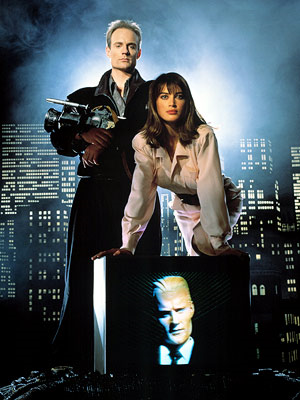
Max Headroom
RE: And I was like "They did that. They must have some great ideas for using that idea in Super Mario. Bros.," but I kept looking around for it. "Where is it?"
I don't know. I guess maybe they thought Max Headroom was a small movie and this was a big movie and it had to have big sets and expensive production design. I mean, they went to town with the design turning that factory into this alternative world. Maybe that's where all the money went and maybe that was the wrong decision.
RH: On the subject of where the money went--and I don't know how much you know--but before Rocky and Annabel came on board they had a totally different take on the movie. They had a different director and a totally different script. It was going to be a living cartoon, basically. It was going to look exactly like the games.
RE: With live actors?
RH: Yeah.
RE: Digitally planted in?
RH: We're not sure how they would have done it, but we've seen some of the set designs that they thought about doing and it was a lot more like the games themselves. They got pretty far into production before they pretty much canceled that entire idea and they had already spent a few million dollars by that point. They then brought in Rocky and Annabel, who had a totally different concept in mind and the script was rewritten.
RE: I kind of maybe knew something about that, but it didn't seem to really matter at that point because I knew there were maybe three or four or five other scripts before they even got the one that we got when we got there. But I do remember reading it and kind of having a sinking feeling--(laughs)--because it was so silly. It was really written for five-years-old or something. That seemed like the target audience but it also had Daisy in a skimpy outfit. I don't know. (laughs)
So there's a scene where Koopa and, what's Fiona Shaw's [character]? The Queen?
SA & RH: Lena.
RE: Lena, yeah. They're in their bedroom or something and we come down the stairs and we walk through the mud or something. We have a scene. I don't know what we're saying.
RH: It's the scene where you tell Koopa that the Mario Bros. escaped in the tunnel and they're in the desert?
RE: Right. That's right. We show up for that and Dennis comes in and he starts bawling out the directors because they had rewritten the scene and he had to learn [new] lines and couldn't stop. It's that scene, but the scene after was the scene in the main street, so there was like a thousand extras waiting so they could get the shot and get on set and do that scene before lunch, but Dennis wouldn't stop yelling at them. It was really embarrassing.
He was just going off about how unprofessional they were. [He was saying] "I've worked on so many movies. I've never had this happen to me before." Rocky and Annabel were just trying to calm him down, [saying] "Okay, Dennis. We're really sorry," and trying to explain. The more they tried to explain [the more] it just fueled the fire. Fiona, who's a Royal Shakespeare [actress], was just like "Oh my God. I'll never work in Hollywood again. This is ridiculous." You could tell.
My mouth is hanging open, "Oh my God," and, literally, it went on and on and on. He wouldn't stop. He just could not stop and I think Jake and Roland came down. They all tried to talk to them and he's just yelling over them. "It's just so unprofessional! How do they expect me to deal with this kind of work!"
RH: Wait. Is all of this happening while he's sitting in the mud or he's out of the mud?
RE: He's out of the mud. No, this is before he ever got in the mud. This was before we even did the scene. So finally they call an early lunch and they are going to continue this discussion up in the producers' office over lunch and they ask me and Fisher to come along and I had no idea why. They wanted us. But we go there and, of course, Dennis continues to lambast the directors and we're just sitting there.
They bring lunch and Fisher and I are looking at each other and we're kind of like trying to stop from laughing because it's so funny. The whole thing is so funny. And Rocky and Annabel are so put upon and Roland [and Jake are] proper Englishmen. They're all so proper and you have this "wildman," Dennis, going nuts on them and nothing they can say is doing any good.
And this is like now 2, 2 ½ hours of him going on and on and on and repeating himself and variations, whatever, and finally Rocky and Annabel just go "Please, Dennis, just tell us what you want us to do. We'll do anything you want." They're begging him. And he looks at them as if they're out of their f*cking mind and goes "Why are you asking me? I'm not the writer. I'm just an actor."
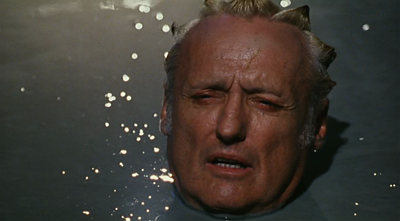
"Why are you asking me? I'm not the writer. I'm just an actor."
RH: Wow.
RE: And they're like "But what do you want us to do?" and he's like "Well you tell me," and they said "Why don't you just do it the way it's written?" and he says "Fine." So after three hours he agrees to do it exactly the way it was rewritten and that's what we did. And then a couple days later: now, Dennis…
I don't know. I think he did way too many drugs or something. He wasn't all there at the scene. He kind of became a "Countryclub Republican," too. I remember talking to him at a couple parties. He wears pacaw shirts. This is like the "Wildman of Hollywood" and now he's a golf-playing Republican. I'm like "What the fuck." That's a good advertisement for not doing drugs, right there.
But I saw him and I said "Dennis, I'm curious. I totally agreed with you about how unprofessional it was, but don't you think that by doing what you did [it] might have had a negative impact on not just the scene but all the other people there? Like us? We had to suffer through the whole thing and it might have affected our attitude and performances," and he goes "You know, I never thought of that. You're right. You're right. You're right. I'm sorry. Yeah. Yeah. Yeah. You're right. Thanks for telling me that. I'm sorry," and then he walks away. So. (laughs)
SA: (laughs)
RH: (laughs) I think the scene that you're talking about was written better originally. I don't know what they changed, but I think there was almost a subplot that they decided not talk about as much, so they just rewrote the scene.
Oh, and speaking of that it seems like there was a political subtext in the movie--and all that stuff was cut out of the movie--where Koopa was running for re-election and Iggy and Spike kind of explain to Mario and Luigi about "Koopa the Sportsman" and "Koopa the Environmentalist," etc., and after that you're in the garbage truck and talk to them about the Statue of Repression, which is like their world's version of the Statue of Liberty. Do you remember that?
RE: Right. Vaguely. Vaguely. It just seemed like there were too many ideas and none of them were really developed that well. So yeah. It's not like I think any of us were invested at that point in the outcome. We agreed to join this mad undertaking. Let's just agree to survive it with our sanity intact. That seemed to be all of the actors' approach: Be professional about it and try to improve it when we could and be professional when we couldn't.
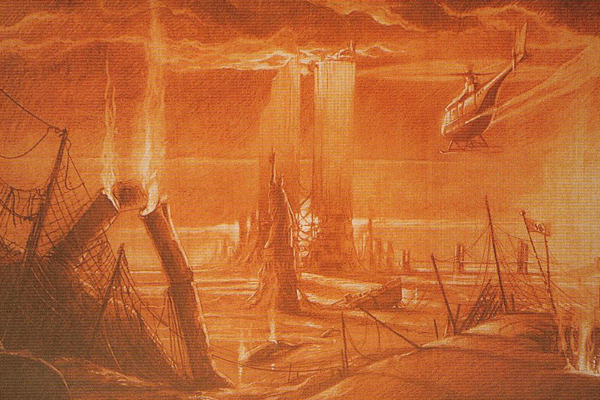
From one of the scripts: "IGGY: But now...come to think of it...it has become a rather cruel, oppressive place, isn't it?"
RE: And it's hard not to take that attitude when you're living high on the food-chain like that and you know you're getting paid better then you probably should be, but you're not going to turn it down. You're living well and you're having fun in spite of it. I mean, that wasn't my worst experience because everybody was cool. I mean, even Rocky and Annabel weren't not cool except they were a two-headed directing beast who didn't agree with each other. But the fact that we were given the leeway to create our own dialogue and stuff took a lot of the stress out of dealing with Rocky and Annabel because they never directed us. By the end I think they were happy and the writers were happy and it gave us something to do. You know, something creative to do. We were enjoying it.
But I think part of it was they were so clearly out of their element because they came from animation and commercials. This was their first opportunity at a large, Hollywood-style production. Three things [in directing] is working with actors, telling a story and dealing with a production that size and it just seemed like they were not ready or incompetent in every way. (laughs)
And the fact that they were fighting and they didn't agree with each other. That was what blew my mind. How could they be in this position and not agree? Or they agreed to disagree and then basically ignored each other. How did they go home? I guess they eventually got divorced or something.
RH: Yeah, they did.
RE: But they stayed together for awhile after the fact. They were going up for a commercial. It was like a Coca-Cola commercial or something. What are they doing now?
SA: They're separately directing at different companies. They both still do commercials. I know that Annabel recently directed a made-for-TV adaptation of a novel that was very well-received, but they're not doing anything in Hollywood anymore.
RE: Cool. Cool. They were individually kind of very pleasant. Especially Rocky I remember being a very pleasant guy. Annabel was the more intense of the two.
SA: Do you have any other stories with interactions with the other actors?
RE: Now that I remember, there is this strange thing. Fisher and Samantha shared a beach house on the beach itself in Wilmington. My house was off of the beach, but on the water on the bay. They preferred to be right on the beach and Fisher had the upstairs and Samantha had the downstairs.
I do remember Fisher was going out with Michelle Pfeiffer at the time and she would come down to visit, but she was a very kind of shy, introverted person. Not very outgoing and one of Fisher's lizards was sick, so that became her "project." She took care of the lizard and took him to town to veterinarians and spent all day finding a veterinarian in the area who specialized in lizards. She took him all over and I was like "Woah, a little obsessive," but she was a sweet girl, but I guess she always had to have something to do and that was her thing, to take care of the lizard. To heal it.
But, I went over there one day and Samantha goes "There's something strange about this house." "What do you mean strange?" "Well, the basement." "What do you mean the basement?" "Well, go down there and tell me what you feel," and I'm like "What are you talking about?"
She points to the door and she goes "There." "Like, that?" "Yeah, go down." So I open the door and take two steps down and I get the creepiest feeling. I still can remember. My skin started to crawl and I go down a couple more stairs and it feels like I'm walking into a freezer or something and I have the feeling or image that something really terrible had happened there. There was the residue of that thing. And I'm like "I'm not going fucking down there," so I run up the stairs and shut the door and go to Samantha "What the fuck was that?" She goes "I told you, right?" I was like "What happened? What is it?"
"Well, the woman who rented the house said something terrible happened down there. Some girl had been imprisoned and raped or something or murdered or something." I was like "Woah." They didn't tell me that before I went down there. I couldn't believe she could actually live in the place knowing that you couldn't even open a door. I don't know. I don't know. Whatever. Maybe it was the power of suggestion, but I do remember that. (laughs)
RH: Wow.
RE: That had nothing to do with Super Mario Bros.
RH & SA: (laughs)
RE: I do remember, I don't drink that much, but there was a party one night after we worked and I did get a little drunk and I was driving to meet some of the other actors at a hotel that was at the end of the beach and a cop stops me and he said "You know, you were weaving all over the road," and somehow I talked my way out of it or something. I think I told him the truth "I was working on this movie and I had a long day. I might have had a few beers, maybe one too many.” He said "Oh, you know, just don't do it again," or something like that. Woah. Somebody was smiling down upon Super Mario Bros. Not all the time, but some of the time.
RH: Well, the website itself has been pretty interesting in what we've been able to figure out and who we've been able to talk to, including yourself. But what I've been trying to do is get one of the local film societies to obtain a print of the movie and we're going to try to have a re-screening of it down here in the theatre.
RE: Down there. You mean Tennessee?
RH: Yeah. In Tennessee, but we're also trying to figure out if we can do it down there in L.A., too.
RE: So you're asking me if I'd be interested in showing up?
RH: Oh, yeah.
RE: I don't know. We'll cross that bridge when we get to it.
SA: Right. Well, a few of the other people we've brought the idea to have said "Oh yeah, we'd show up," or they'd lend us props to showcase. It'd essentially be a Q & A reunion. That film society was also suggesting possibly making documentary kind of thing on the film and its role as a cult classic.
RH: Yeah. They know a couple documentary people and they were suggesting making a short film about us and the website and our efforts in trying to get the movie back into theatres.
RE: Well, good luck. I have your E-mail, Steve, so I'll send you these photos because I just scanned like all of my movie stuff, so I know there's quite a few. I know I got a bunch somewhere. I'm pretty organized.
The one other thing was that we had a lot of time on our hands and both Bob Hoskins and Fiona Shaw were trained at Royal Shakespeare so we decided to do a reading of MacBeth. All the actors would get together and Bob Hoskins and Fiona Shaw would lead the reading and Bob would play-- Oh no, I think we did two. We did MacBeth and we did The Tempest.
SA: I heard that they had done Midsummer's Night Dream at one point, too.
RE: I don't remember that one.
SA: Michael Harding, one of the Goombas that we interviewed, said that Francesca Roberts had played Tatania.
RE: Right. She took place in the readings? I think she did. Yeah. It was real fun. I had no background in Shakespeare, so it was a lot of fun. Fiona and Bob would give us background and we did it with dinner and Bob was staying at this bed-and-breakfast. This old pre-Civil War mansion. Beautiful, beautiful mansion [in] downtown Wilmington and he had the top floor of it. I think he had his assistant there with him so we would do it out there in the hall and put candles and have dinner and then do the reading and Bob and Fiona would kind of give background to it. We'd actually feel like we're real actors instead of punching clocks at Super Mario Bros.
SA: It's pretty great to hear that you had a great cast to work with. Everyone was really friendly.
RE: Yeah. And it was funny. About a year or two later I read an interview with Bob Hoskins. I think he had gone back to England and he did that kind of cool black-and-white movie about a boxing club and they interviewed him and he was like "Yeah. I'll never work in Hollywood again because the last experience was so terrible," and I knew he was talking about Super Mario Bros. But I think he came back.
SA: Yeah, I think he's coming back for "Roger Rabbit 2," but I'm pretty sure he's done a few other Hollywood films since Super Mario Bros.
RE: It took him awhile. His fellow countrymen--Jake and Roland and Rocky and Annabel--they're all English. Anyway, I think you got enough, right?
RH: Oh, sure.
SA: Sure. Thanks for taking the time out.
RH: Yeah, thanks a lot!
RE: Well, cool. I hope it helps your website. I'll send you those pictures. That's that then.
SA: Thanks.
RH: See ya.
RE: Bye bye.
